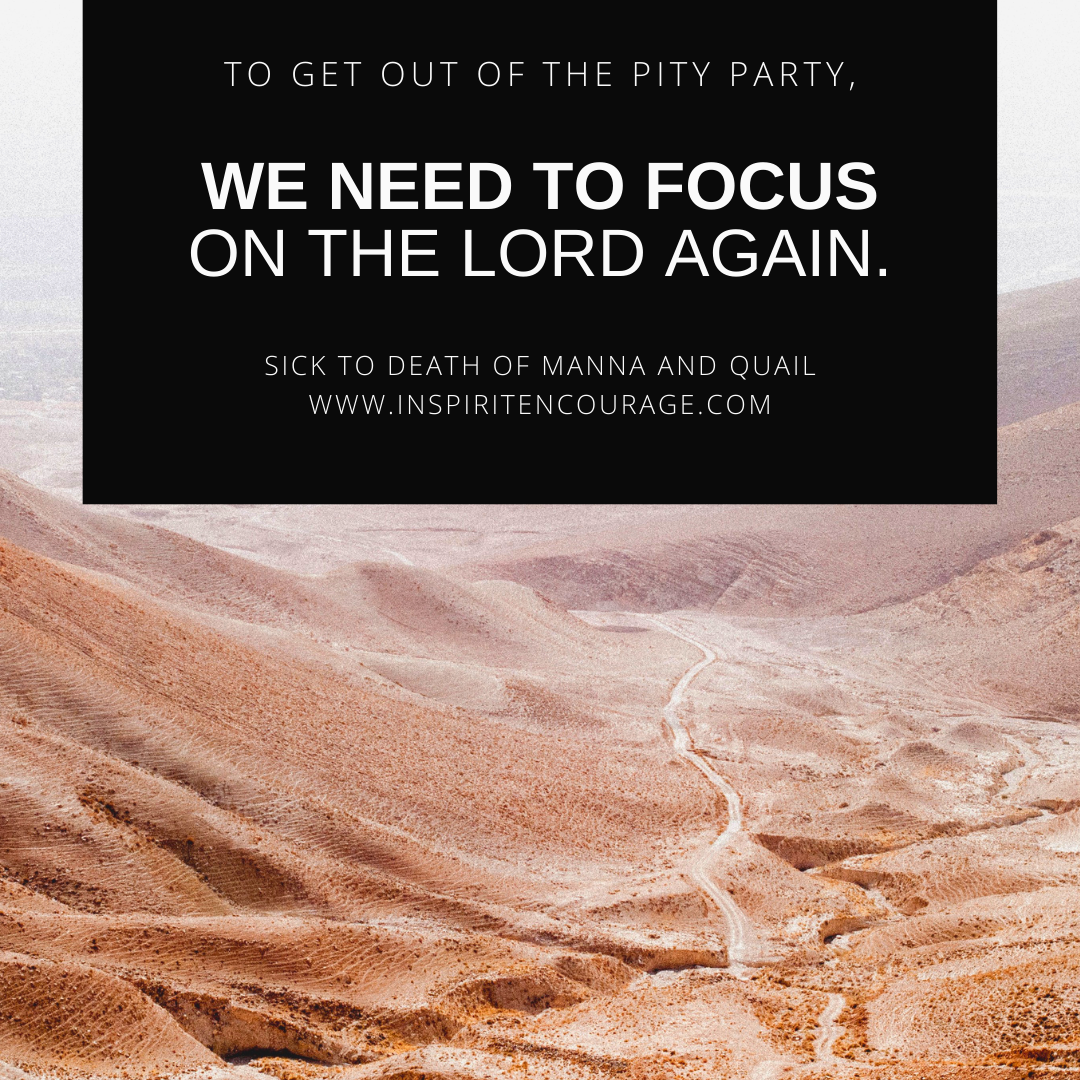Sick to death of Manna and Quail - Numbers 11
The story in Numbers 11 begins with the Israelites complaining. They complained a lot. Before the quail, they complained that there was no water to drink. Throughout the books of Moses, the Israelites complained. They were consumed with the ‘good’ they had when they lived in Egypt. Let’s put that another way: they were consumed with how well-off they were when they were slaves…slaves.
Here too, the Israelites stand at their tents and lament the cucumbers and fish they had for free while they were in Egypt. Funny that they remark it was free… I don’t think they were working for the manna. They surely worked for the fish and melons they had in Egypt. The people were complaining of their current situation and dwelling on their past. They were wallowing in self-pity. I would go so far as to say they were mired in it and, like quicksand, were sinking.
Self-pity is the excessive and unrestricted dwelling on one’s own sorrows or misfortunes. I can only imagine the sounds in the camp of over 2 million people, each tent in its own sorrows. Even children pick up on such feelings and would likely complain about the balls and dolls they had to play with.
The Israelites’ self-pity blinded them to the reality of their situation and robbed them of their blessings and their vision. What the people saw was a meager life, one constantly on the move and they rejected the Lord (verse 20).
Numbers 11 opens with complaining of their hardships and in response, the Lord sent a fire which consumed some of the outskirts of the camp. They cried to Moses who prayed, and the fire died out. Again, in just the next verse, they are complaining and wailing. The people were greedy and wanted more than they had, more than was sufficient. They wanted more than manna. They could not see that manna was the Lord’s provision. Reality- The Lord provides.
They wanted the ‘free’ fish and cucumbers and onions, what they had in Egypt. In other words, they longed for the time they were in slavery. The Lord had led them over the dry sea and killed the enemy army in the waters, but they wanted to return to making bricks for the Egyptians because they could have fish. They didn’t accept the freedoms that came to them in crossing over. Reality- The Lord set them free.
Even Moses seems to get caught in this round of self-pity, asking God what he ever did to deserve these people and how in world could he carry this burden. But God answered by sharing out the burden that Moses carried. Moses was able to hand over some of the burden to the elders of the Israelites, and with God’s blessing. Reality- The Lord responds when we ask.
Moses couldn’t see how to feed the people. After all that Moses had seen so far, he couldn’t imagine what God would do. Bread came from nowhere overnight, every night. Yet, Moses could not see how God would send meat. And God responds by saying ‘what, am I limited in my power?’. Moses was blind to power of God and the possibilities of trusting in Him. Reality- The people no longer believed and lacked vision.
These four statements of their reality are a direct result of self-pity. Self-pity is the over-focusing on ourselves. We are called to have Jesus at the center, but self-pity puts self at the center. So, to get out of the pity party, we need to focus on the Lord again. We need to check our version of reality and look for a new vision, God’s vision of reality.
We want more, but do not recognize that he has provided all that we have.
We feel caged in and stuck, but we have not recognized the freedom we have in the Lord.
We are heavy burdened, but we do not ask God and others to share it with us.
We do not see the way, but we do not seek His way.
Self-pity will come and it can take hold like it did for the Israelites. Jesus in the Garden of Gethsemane too said he did not like his current condition, but he accepted what God decided and embraced his condition and his coming death. Jonah complained and asked for death in Chapter 4 of his story, but God reminds him that He is in control and has compassion.
Just a few chapters later, in Numbers Chapter 14, the Israelites are faced with the reality of the promised land yet are not willing to take off the blinders and step into the provision and vision that God has for them. They complain that they should have already died and reject the promised land. Joshua is the one who speaks up and sees the reality of the situation, that God has led us to a good place. Joshua sees that the Lord is with us. It is in the understanding of the reality of our current situation, accepting that God has put us in this place for our good, and He is in control that we will move out of self-pity.
